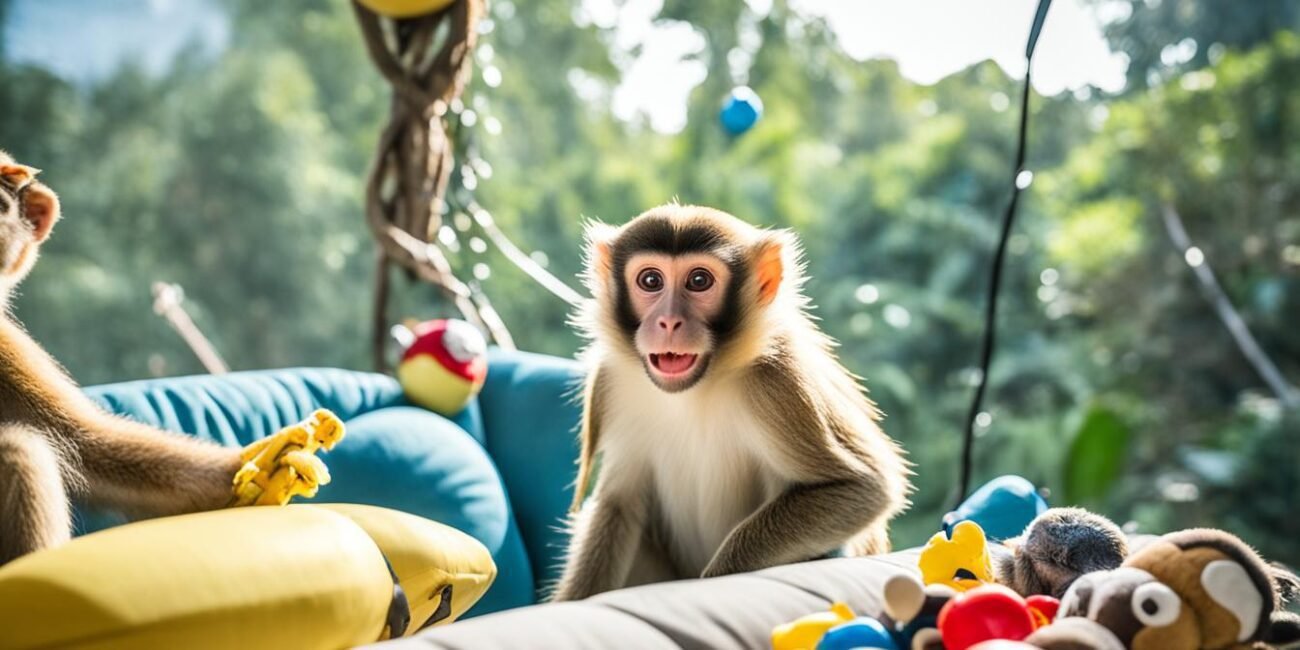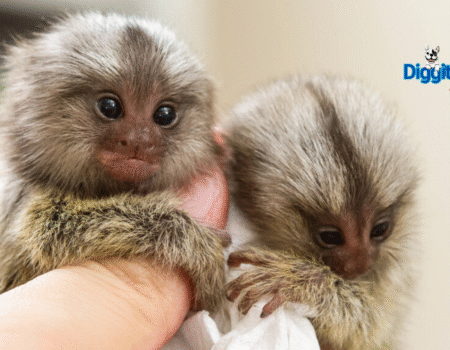Owning a pet monkey can be an exciting and unique experience for those interested in exotic pets. However, it’s essential to consider the pros and cons before bringing a monkey into your home. Monkey ownership requires a deep understanding of primate care, as these animals have specific needs that differ from traditional pets.
Monkeys are fascinating creatures, known for their intelligence and sociability. However, they are not like dogs or cats. They require a lifelong commitment and specialized care to live a healthy and happy life. From providing a suitable living environment to meeting their dietary and socialization needs, owning a monkey involves unique challenges.
The legality of keeping a monkey as a pet also varies by location. Some areas prohibit monkey ownership entirely, while others have specific regulations and permit requirements. Before considering a monkey as a pet, it’s crucial to research and understand the laws in your area to ensure compliance.
The cost of acquiring and caring for a monkey can be significant. From the initial purchase to ongoing veterinary care, specialized diets, and providing a stimulating environment, the financial commitment should not be underestimated. Additionally, homeowner policies and insurance coverage may be affected by owning a monkey, as they can pose potential liability risks.
In this article, we will explore the pros and cons of keeping a monkey as a pet, addressing the behavioral challenges, legal considerations, health and medical concerns, financial implications, housing requirements, socialization needs, and ethical considerations. By understanding these aspects, you’ll be better equipped to make an informed decision about whether a monkey is the right pet for you.
Behavioral Challenges of Owning a Pet Monkey
Pet monkeys may seem adorable and friendly when they are babies, but as they grow, they can present numerous challenges due to their wild nature. Monkeys do not undergo the same development process as human children, and this can lead to the development of severe behavioral problems, including aggression and destructive tendencies. Therefore, it is important to understand that owning a pet monkey requires extensive behavioral management and training to ensure the safety and wellbeing of both the monkey and its owner.
Socialization and training are key factors in helping monkeys adapt to living in a human household. Monkeys are highly social animals and require ample opportunities for interaction and engagement. Without proper socialization, they can become isolated and develop behavioral issues. Professional guidance from experienced primate trainers is crucial to ensure monkeys receive the appropriate training and socialization needed to thrive in captivity.
Even with proper training, it is important to note that monkeys can still exhibit unpredictable behavior, including biting. This can be particularly challenging as monkeys possess sharp teeth and strong jaws, which can cause serious injuries. Seeking professional help and advice on how to manage and prevent aggressive behaviors is essential for the safety of both the monkey and its owner.
“Monkeys do not undergo the same development process as human children, and this can lead to the development of severe behavioral problems, including aggression and destructive tendencies.”
It is essential to understand that owning a pet monkey requires a significant commitment of time, effort, and resources. Monkeys need a stimulating environment and regular mental and physical enrichment activities to prevent boredom and the development of problem behaviors. Providing appropriate toys, interaction, and space for their natural behaviors, such as climbing and exploration, is crucial for maintaining their overall wellbeing.
For a better understanding of the behavioral challenges associated with owning a pet monkey, refer to the following table:
| Behavioral Challenges | Impact |
|---|---|
| Aggression | Can lead to injuries for both the monkey and its owner |
| Destructive tendencies | Damage to property and potential safety hazards |
| Unpredictable behavior | Difficulty in managing and predicting the actions of the monkey |
| Socialization issues | Isolation and the development of behavioral problems |
Understanding the behavioral challenges of owning a pet monkey is essential for prospective owners. It is important to evaluate your ability to provide the necessary training and guidance to ensure the monkey’s wellbeing. Seeking guidance from experts in primate behavior and training can significantly enhance the overall experience of owning a pet monkey.
Legal Considerations for Owning a Pet Monkey
Before deciding to bring a monkey into your home as a pet, it is crucial to be aware of the legalities surrounding primate ownership. The laws and regulations regarding keeping monkeys vary depending on the country and even within different states of the United States. Understanding the specific laws in your area is essential to ensure compliance and avoid potential legal issues.
In some states, monkeys are prohibited as pets altogether, while others have specific restrictions and permit requirements. It is important to research and familiarize yourself with the regulations that apply to your location. Additionally, home inspections may be required to ensure that you can provide the necessary facilities and care for the monkey.
This is a long-term commitment and you need to make sure you are prepared to meet all legal requirements and provide a suitable environment for the monkey’s well-being.
It is also worth noting that owning a monkey can have implications for your homeowner policy and insurance coverage. Monkeys can be perceived as a liability risk, and some insurance providers may require additional coverage or even exclude liability for incidents involving the monkey.
Legal Considerations for Monkey Ownership
| Legal aspects | Considerations |
|---|---|
| Permit requirements | Research and comply with any necessary permits for monkey ownership in your area. |
| Home inspections | Ensure your home meets the necessary standards for housing a monkey. |
| Insurance coverage | Review your homeowner policy to understand how owning a monkey may affect your coverage. |
When considering a pet monkey, it is essential to navigate the legal landscape to ensure a responsible and lawful ownership experience. Adhering to the legal requirements will not only protect you from potential legal consequences but also contribute to the well-being and conservation efforts of these extraordinary creatures.
Health and Medical Concerns for Pet Monkeys
When keeping a pet monkey, it is crucial to prioritize their health and well-being. Monkeys are prone to various health issues and can even transmit zoonotic diseases to humans, making their medical care a top priority. Finding a veterinarian experienced in primate care can be challenging, but it’s essential for ensuring proper diagnosis and treatment.
One of the key aspects of maintaining a healthy monkey is a well-balanced diet. Monkeys have specific dietary requirements that must be met to support their growth and development. A diet rich in fruits, vegetables, and commercially formulated monkey chow is essential to provide them with the necessary nutrients.
However, diet is not the only consideration for their overall well-being. Monkeys are intelligent and active animals that need mental and physical stimulation. Enrichment activities play a crucial role in preventing boredom and behavioral problems. Providing toys, puzzles, and climbing structures can help keep your monkey engaged and stimulated.
Common Health Issues in Pet Monkeys
Just like humans, monkeys can suffer from a range of medical conditions. Some common health issues seen in pet monkeys include:
- Diabetes: Monkeys may develop diabetes, which requires regular monitoring of blood glucose levels and a controlled diet.
- Respiratory Infections: Monkeys are susceptible to respiratory infections, such as tuberculosis, which can be transmitted to humans.
- Gastrointestinal Issues: Digestive problems, such as constipation or diarrhea, can occur in pet monkeys due to dietary changes or improper nutrition.
- Dental Problems: Dental issues, including tooth decay and gum disease, can impact a monkey’s overall health and well-being.
- Parasites: Monkeys can be affected by various parasites, such as intestinal worms and ticks, requiring regular deworming and preventive measures.
Regular veterinary check-ups are essential to catch any potential health issues early on and ensure prompt treatment. Additionally, maintaining a hygienic living environment and practicing good hygiene habits when handling your monkey can help prevent the spread of diseases.
| Health Concerns | Symptoms | Treatment |
|---|---|---|
| Diabetes | Increased thirst, frequent urination, weight loss | Insulin injections, controlled diet |
| Respiratory Infections | Coughing, sneezing, difficulty breathing | Antibiotics, supportive care |
| Gastrointestinal Issues | Diarrhea, constipation, abdominal pain | Dietary management, medication |
| Dental Problems | Bad breath, tooth loss, difficulty eating | Dental cleaning, extractions |
| Parasites | Itching, hair loss, visible parasites | Deworming medications, flea and tick prevention |
By addressing their specific dietary needs, providing enrichment activities, and ensuring regular veterinary care, you can help promote the health and well-being of your pet monkey. Remember, a happy and healthy monkey is a result of responsible ownership and dedicated care.
Financial Considerations of Owning a Pet Monkey
Owning a pet monkey can be an exciting and rewarding experience. However, it is essential to understand the financial implications before making the decision to bring one into your home. The cost of owning a monkey goes beyond the initial purchase price, varying depending on the species and where you acquire it. Let’s explore the financial considerations associated with owning a pet monkey.
Cost of Owning a Monkey
The initial cost of purchasing a monkey can range from $5,000 to $70,000, with certain species being more expensive than others. Factors such as breed, age, and the breeder’s reputation can influence the price. It is crucial to research and find reputable breeders or primate sanctuaries that comply with legal guidelines and prioritize the well-being of the animals.
Specialized Diets and Veterinary Care
Monkeys have unique dietary needs, and providing them with proper nutrition can be costly. Their diet typically consists of a combination of fruits, vegetables, and commercially formulated monkey chow. Additionally, specialized veterinary care is necessary to ensure their health and well-being. Finding a veterinarian experienced in primate care may require additional travel and expenses.
Moreover, monkeys require regular veterinary check-ups, vaccinations, and preventive measures against zoonotic diseases. These medical expenses should be considered when budgeting for the cost of owning a pet monkey.
Enrichment Activities and Environmental Needs
Monkeys thrive in an environment that provides mental stimulation and enrichment. They require plenty of toys, climbing structures, and space to explore and play. Designing and maintaining a suitable living environment for a monkey can involve expenses for creating or modifying enclosures and providing a constant supply of engaging and interactive toys.
Insurance and Liability
Owning a pet monkey may affect your homeowner’s insurance policy. Some insurance companies either exclude primates from coverage or require additional liability coverage due to the potential risks associated with their behavior. It is important to review your insurance policy’s terms and conditions or consult with your insurance provider to ensure appropriate coverage and legal compliance.
Long-Term Financial Commitment
It is crucial to consider the long-term financial commitment of owning a pet monkey. Their lifespan can range from 20 to 40 years, and their needs will evolve over time. Ongoing expenses for food, veterinary care, and enrichment activities should be factored into your budget for many years to come.
Ultimately, the cost of owning a pet monkey extends beyond the initial purchase price. Specialized diets, veterinary care, enrichment activities, and potential changes to your insurance policy all contribute to the financial implications of owning a monkey. Before making the decision to bring a monkey into your home, ensure you have the resources and commitment to provide a high standard of care throughout its life.
Challenges of Housing a Pet Monkey
Providing a suitable living environment for a pet monkey can be challenging. Monkeys require a large and secure enclosure that allows them to climb, swing, and explore, mimicking their natural habitat. It is essential to meet their physical and behavioral needs to ensure their well-being in captivity.
Specific states have established enclosure requirements that must be met to obtain a permit for keeping a monkey as a pet. These regulations aim to ensure the safety of both the monkey and the surrounding community. Adhering to these guidelines not only minimizes the risk of escapes but also provides the monkey with a stimulating and enriching environment.
Monkeys thrive on outdoor time for exercise and mental stimulation. Therefore, it’s important to provide them with access to fresh air and natural light. This can be achieved through enclosed outdoor areas or designated monkey enclosures that allow for safe exploration and interaction with their surroundings.
Living in a traditional house may not meet the space and environmental enrichment requirements that monkeys need. They require ample room to climb, swing, and engage in natural behaviors. Providing tall structures like trees or climbing gyms, ropes, and branches inside the enclosure can help simulate their natural habitat and encourage physical activity.
Neighbor Relations and Noise Concerns
Monkeys can be vocal creatures, which may cause issues with neighbors in residential areas. It’s crucial to consider the potential noise disturbances that a pet monkey can create. To mitigate this, proper communication and education on monkey behavior with neighbors are essential.
Ensuring Safety
When housing a pet monkey, safety measures should be a priority. Monkeys possess strength, agility, and curiosity, which can lead to potential accidents or injuries. Ensuring that the enclosure is escape-proof and equipped with secure locks is crucial. Additionally, regularly inspecting the enclosure for any wear and tear and addressing maintenance issues promptly will help prevent escapes and potential harm to the monkey or others.
Table: Monkey Enclosure Requirements
| Requirement | Description |
|---|---|
| Size | Monkeys need a spacious enclosure that allows for climbing, swinging, and exploring. The size requirements may vary depending on the monkey species and regulations in your area. |
| Security | The enclosure must be escape-proof, with secure locks and strong materials to prevent the monkey from getting out and others from getting in. |
| Enrichment | Provide a stimulating environment with structures, such as trees, ropes, and climbing gyms, that allow the monkey to engage in natural behaviors. |
| Outdoor Access | Monkeys require outdoor time for exercise and mental stimulation. The enclosure should have provisions for access to fresh air and natural light. |
Socialization and Interactions for Pet Monkeys
Socialization plays a vital role in the mental health and overall well-being of pet monkeys. These intelligent and social creatures thrive on interactions, not just with humans but also with their fellow monkeys. Depriving a monkey of normal social relationships can have serious consequences, leading to behavioral issues and psychological distress.
Just as humans need social connections, monkeys require constant attention and interaction to prevent the development of severe behavioral problems. For instance, introducing new individuals, such as spouses or children, into the monkey’s environment can be challenging, as monkeys may struggle to adjust to these new individuals.
Understanding the social nature of monkeys is essential to their well-being when kept in captivity. By providing them with a stimulating and socially enriched environment, they can lead fulfilling lives. Social interaction not only helps monkeys maintain their cognitive abilities but also prevents boredom and encourages natural behaviors.
“Just as humans need social connections, monkeys require constant attention and interaction to prevent the development of severe behavioral problems.”
One way to facilitate social interactions for pet monkeys is to consider providing them opportunities to interact with other monkeys. This can be done through supervised visits to primate sanctuaries or arranging playdates with other monkey owners, allowing them to engage in natural behaviors and form social bonds.
Additionally, it is important to note that the level of social interaction required varies depending on the species of monkey. Some species are more social than others and may have specific socialization needs. It is crucial to research and understand the specific social requirements of the monkey species before bringing one into your home.
Social Interaction Checklist for Pet Monkeys:
- Ensure the monkey has daily interaction with humans and other monkeys, if possible.
- Invest in toys and puzzles that encourage cognitive engagement and social play.
- Provide opportunities for the monkey to explore their environment and engage in natural behaviors.
- Consider supervised visits to primate sanctuaries or playdates with other monkey owners.
- Consult with primate experts or trainers to learn more about socialization techniques tailored to your monkey’s needs.
Ethical Considerations of Owning a Pet Monkey
Ethical concerns surround the ownership of pet monkeys. Monkeys are wild animals, and keeping them as pets goes against their natural instincts and behaviors. They cannot be fully domesticated, and attempting to do so can lead to physical and psychological harm for both the monkey and the owner. While it may be possible to form a bond with a pet monkey, it does not change their true wild nature.
Supporting primate sanctuaries that provide monkeys with a natural and free life is the recommended approach to ensure their well-being.
| Benefits of Supporting Primate Sanctuaries | Drawbacks of Keeping Pet Monkeys |
|---|---|
|
|
Conclusion
Owning a monkey as a pet may seem enticing, but it is important to consider the numerous challenges and responsibilities associated with primate care. From behavioral issues to legal restrictions and specialized healthcare needs, monkeys require a significant commitment of time, effort, and financial resources. Before embarking on this journey, thoroughly research the laws and regulations in your area and seek guidance from experienced primate trainers and veterinarians.
However, it is essential to remember the ethical considerations surrounding pet ownership of monkeys. These fascinating creatures are wild animals and have innate instincts and behaviors that cannot be fully domesticated. Supporting primate sanctuaries that provide monkeys with a natural and free life is a more suitable way to appreciate and protect them.
While the idea of having a pet monkey can be alluring, it is crucial to prioritize the overall well-being of both the monkey and yourself. By educating ourselves about their needs and contributing to conservation efforts, we can ensure a brighter future for monkeys while enjoying their beauty from a respectful distance.
FAQ
What are the pros and cons of keeping a monkey as a pet?
Owning a pet monkey can be a unique and rewarding experience, but it also comes with various challenges. Monkeys require a significant commitment of time, effort, and financial resources. They have special behavioral and medical needs and may not adapt well to living in a human household. It is important to thoroughly research and consider the pros and cons before deciding to own a monkey.
What are some behavioral challenges of owning a pet monkey?
Pet monkeys can develop severe behavioral problems, such as aggression and destructive tendencies. They require extensive behavioral management due to their wild nature. While socialization and training are crucial, monkeys can still exhibit unpredictable behavior, including biting. Seeking professional help from experienced primate trainers is recommended to ensure the safety and well-being of both the monkey and its owner.
What legal considerations should I be aware of when owning a pet monkey?
The legality of owning a pet monkey varies by location. Different countries and states have varying laws and regulations regarding primate ownership. It is essential to research and understand the specific laws in your area before considering a monkey as a pet. Some states prohibit monkeys as pets entirely, while others have specific restrictions and permit requirements. Home inspections may also be necessary to ensure proper facilities and care for the monkey.
What health and medical concerns should I be aware of when owning a pet monkey?
Pet monkeys are susceptible to various health issues, and specialized care is required to maintain their well-being. They can transmit zoonotic diseases to humans and may require specialized diets and regular monitoring for conditions like diabetes. Enrichment activities and a stimulating environment are crucial for their mental and physical health. It is important to find a veterinarian with experience in primate care to ensure proper medical treatment for the monkey.
What financial considerations should I take into account when owning a pet monkey?
Owning a monkey can be a significant financial commitment. The initial cost of purchasing a monkey can range from $5,000 to $70,000, depending on the species. Monkeys also require specialized diets, veterinary care, and enrichment activities, which can be costly. Additionally, homeowner policies may require additional liability coverage or restrict coverage altogether when a monkey is owned. It is important to consider the long-term financial implications of owning a pet monkey before making a decision.
What are the challenges of housing a pet monkey?
Providing a suitable living environment for a pet monkey can be challenging. Monkeys need a large and secure enclosure that allows them to climb, swing, and explore. Certain states have specific enclosure requirements that must be met to obtain a permit. Monkeys also require outdoor time for exercise and mental stimulation. Living in a traditional house may not provide the space and environmental enrichment necessary for a monkey’s well-being. Ensuring the safety of both the monkey and the public is essential when housing a pet monkey.
How important is socialization for pet monkeys?
Socialization is crucial for the mental health and well-being of pet monkeys. They thrive on social interactions, not just with humans but also with other monkeys. Depriving a monkey of normal social relationships can lead to behavioral issues and psychological distress. Monkeys may not easily adjust to new people in the owner’s life, including spouses and children. They require constant attention and interaction to prevent the development of severe behavioral problems.
What ethical considerations should I keep in mind when owning a pet monkey?
Owning a monkey as a pet raises ethical concerns. Monkeys are wild animals, and keeping them as pets goes against their natural instincts and behaviors. Attempting to fully domesticate them can lead to physical and psychological harm for both the monkey and the owner. Supporting primate sanctuaries that provide monkeys with a natural and free life is recommended to ensure their well-being.
Is owning a pet monkey a suitable choice for everyone?
Owning a monkey as a pet comes with numerous challenges and considerations. They require a significant commitment of time, effort, and financial resources. From behavioral issues to legal restrictions and the need for specialized care, pet monkeys are not suitable for everyone. It is crucial to thoroughly research the laws and regulations in your area and seek professional guidance from experienced primate trainers and veterinarians. Considering the ethical concerns and the well-being of both the monkey and yourself, supporting primate sanctuaries is a more suitable way to appreciate and protect these fascinating creatures.










No Comment! Be the first one.